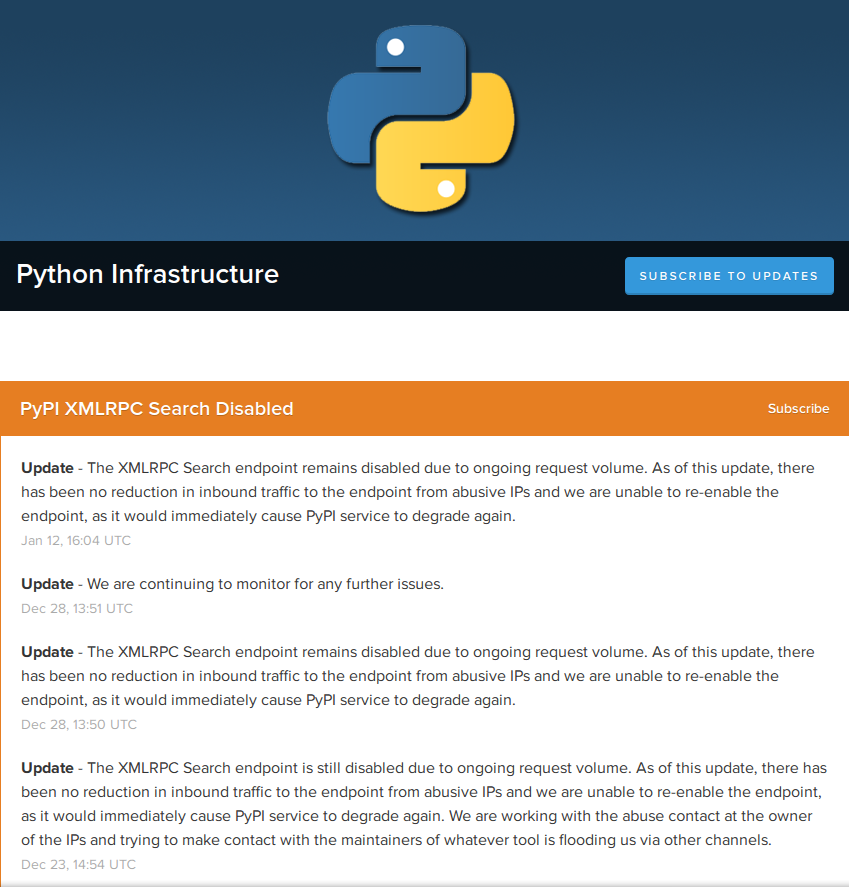Se você tentou usar o pip, o gerenciador de módulos do python, nos últimos tempos então deve ter dado de cara com o seguinte erro:
/tmp > pip search conda
ERROR: Exception:
Traceback (most recent call last):
File "/usr/local/lib/python3.6/dist-packages/pip/_internal/cli/base_command.py", line 224, in _main
status = self.run(options, args)
File "/usr/local/lib/python3.6/dist-packages/pip/_internal/commands/search.py", line 62, in run
pypi_hits = self.search(query, options)
File "/usr/local/lib/python3.6/dist-packages/pip/_internal/commands/search.py", line 82, in search
hits = pypi.search({'name': query, 'summary': query}, 'or')
File "/usr/lib/python3.6/xmlrpc/client.py", line 1112, in __call__
return self.__send(self.__name, args)
File "/usr/lib/python3.6/xmlrpc/client.py", line 1452, in __request
verbose=self.__verbose
File "/usr/local/lib/python3.6/dist-packages/pip/_internal/network/xmlrpc.py", line 46, in request
return self.parse_response(response.raw)
File "/usr/lib/python3.6/xmlrpc/client.py", line 1342, in parse_response
return u.close()
File "/usr/lib/python3.6/xmlrpc/client.py", line 656, in close
raise Fault(**self._stack[0])
xmlrpc.client.Fault: <Fault -32500: "RuntimeError: PyPI's XMLRPC API has been temporarily disabled due to unmanageable load and will be deprecated in the near future. See https://status.python.org/ for more information.">
Olhando no link apontado pelo erro, temos uma bela mensagem de erro.

As mensagens no site são as seguintes:
Jan 12, 16:04 UTC
Dec 28, 13:51 UTC
Dec 28, 13:50 UTC
Dec 23, 14:54 UTC
Dec 15, 20:59 UTC
Dec 14, 17:46 UTC
Dec 14, 17:30 UTC
Dec 14, 15:09 UTC
Dec 14, 09:41 UTC
Traduzindo em miúdos: o site não está aguentando o tráfego. Simples assim.
Não vou entrar no mérito de como o site foi feito, se com flash, django, ou o que quer que seja que esse não é o ponto. O ponto é que fizeram uma péssima arquitetura. Um único ponto de controle que não sustenta o tráfego.
Quantos anos existe o Debian Mais de 25 já. O Debian criou uma solução pra isso já faz mais de uma década: repositórios com mirrors e pacotes assinados. Ao rodar o comando apt ou apt-get, uma listagem dos arquivos disponíveis é verificada. Se a informação do arquivo for a mesma do arquivo local, não é baixado. Isso diminui em muito a carga em cima dos servidores.
Já os pacotes pip usam um formato xml que provavelmente é baixado toda vez. Não só isso: não existe um pip stable, unstable e testing. A cada nova pequena versão do pacote, um novo arquivo é gerado. Isso torna cache dessa list impossível de ser mantido por qualquer mirror. E é o mesmo problema que se encontra em npm, compose, etc.
O contraponto de ter esse arquivo sempre atualizado é ter as versões mais recentes dos pacotes, módulos ou classes que se esteja usando. Mas o custo é alto em termos de capacidade de rede pra aguentar esse tráfego. O resultado é esse que vemos com o pip.
Terá solução? Acredito que sim. Mas sem re-pensar na arquitetura do pip, como receber módulos novos e atualizações, vai ser apenas como enxugar gelo.

